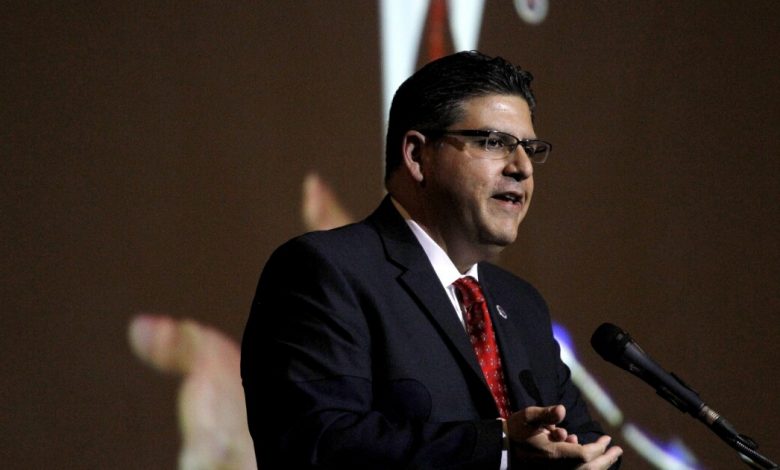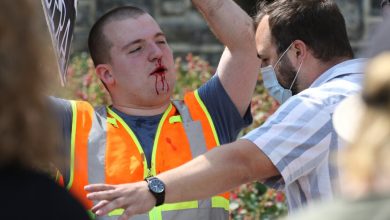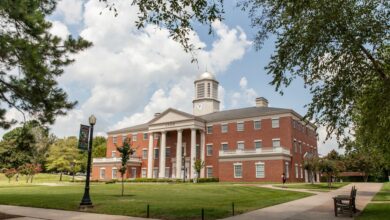Once Considered a ‘Rock Star,’ Cal State’s Chancellor Resigns in Disgrace

When Joseph I. Castro was named chancellor of the 23-campus California State University system, in September 2020, it was celebrated by many as a remarkable rise for someone who started as a first-generation college student, worked his way up through the ranks of California’s top universities, and became known as a champion for Hispanics in higher education.
His resignation on Thursday was a fall that few saw coming. In the end, some California educators believe, his loyalty to a friend and colleague and his willingness to turn a blind eye to the damage the administrator was inflicting on his employees may have cost Castro his job overseeing the nation’s largest system of public four-year universities.
Castro’s resignation followed a nearly 10-hour closed-door meeting of Cal State’s Board of Trustees in which he attempted to explain why he had, as president of Cal State-Fresno, waited so long to meaningfully respond to multiple complaints of sexual harassment and bullying over six years against his vice president for student affairs, Frank Lamas. The board and Castro ultimately decided he should step down immediately. He’d been in the job just over a year.
The abrupt turn of events has left many current and former colleagues feeling conflicted.
Shane Snowdon considered Castro a supporter and good listener when she worked with him as founding director of the LGBTQ resource center at the University of California at San Francisco. Castro was, at the time, UCSF’s vice chancellor for student academic affairs.
“Joe was the strongest administrative ally whom I and many others had in work related to Latinx recruitment/retention and to Title IX,” Snowdon, who now consults with universities and health systems on gender and sexuality issues, wrote in an email to The Chronicle. “I do not for a second endorse his handling of Lamas. And I do not question his resignation; knowing him, I believe that its speed reflected sincere remorse and a genuine desire to free CSU to focus on the underlying issues raised by his handling of an old friend.”
Snowdon added that the situation “exemplifies the complex challenges higher ed faces in trying to promote diversity via human beings who, inevitably, have flaws and make mistakes.”
Castro was the first Mexican American and first native Californian to become Cal State’s chancellor. California’s Gov. Gavin Newsom referred to him as a “rock star” during a 2020 virtual chat.
When he was hired, Castro told of being raised by a single mother, who was a beautician, and his grandparents, who were farmworkers. His great-grandfather had emigrated with the family from Mexico to help build the California railroad, and the family lived in tents up and down the state. Castro was born in the San Joaquin Valley in Hanford, a 40-minute drive from the Fresno campus. He received a scholarship for high-achieving scholars from the valley, and earned undergraduate and master’s degrees from UC-Berkeley before receiving his doctorate in higher-education policy and leadership from Stanford University.
Castro spent more than two decades as a faculty member and administrator in the University of California system before becoming chancellor, a position that gave him an enviable opportunity to influence the outcomes for a student population of nearly half a million, of whom 45 percent are Latino and nearly half are from low-income families. Castro said one of his top priorities was raising graduation rates across the system.
In a statement on February 3, the same day a scathing USA Today investigation broke, Castro apologized to Lamas’s victims but said there was little he could have done until someone filed a formal Title IX complaint. One employee, who contended that Lamas had put his hand on her thigh and hinted at the possibility of a job promotion if she cooperated, did, in 2019. She said that incident followed two years of suggestive and unwanted behavior by Lamas, who has denied any wrongdoing.
Two separate investigations found Lamas responsible for sexual harassment and workplace bullying, but Castro agreed to let Lamas go with a $260,000 payout, retirement benefits, and a clean record in exchange for a promise he’d never work on a Cal State campus again. Castro said it was all he could do to ensure Lamas wouldn’t come back. Title IX experts disagreed.
The fact that he negotiated the settlement quietly and didn’t tell trustees about it when he was being considered for the chancellor position suggests to some that Castro was eager to cover up a messy episode in his past that would reflect poorly on his management abilities.
Reactions continued to pour in on Friday from those who worked with Castro on campuses across the state. They reflected a mix of relief, sadness, and concern about what it would mean for the system in the future.
Cristina Herrera, a former chair of the department of Chicano and Latin American studies on the Fresno campus, said Castro had been right to step down, but she worries the university won’t adequately deal with what she sees as systemic problems in tackling harassment. Herrera, who is now a professor of Chicano and Latino studies at Portland State University, left Fresno last year after she said a female faculty member repeatedly harassed and threatened her. She said she had complained to the human-resources department but had been told there was nothing the office could do to help. She said that she repeatedly had emailed Castro about what she saw as the campus’s inaction but that he didn’t respond. A spokesperson for the university did not immediately respond to requests for comment on Friday afternoon.
Asked whether she regretted that a prominent Latino leader would be stepping down, she said she was “critical of the sort of blind celebration of people from my community just because we share the same background. What does it matter if they’re Latinx if they continue to produce these systems that harm women or others who have been victimized?”
Charles Toombs, president of the California Faculty Association, said Castro’s resignation was a start. The problem, he said, “is larger than one person. It’s a system of policies and practices that allow abuse and then silence, ignore, and cover it up to protect the image of the institution.”
Toombs, who is also a professor of Africana studies at San Diego State University, said a legislative investigation was needed to determine “if any trustees or administrators knew about his mishandling of the complaints.” If so, he said, they should be removed.
The Board of Trustees plans at its March meeting to vote to hire an outside group that will examine the system’s Title IX policies and procedures. The assessment will start at Cal State-Fresno. A settlement agreement with the chancellor, who was earning a base salary of $635,000, had not been finalized as of late Friday.
Source link






